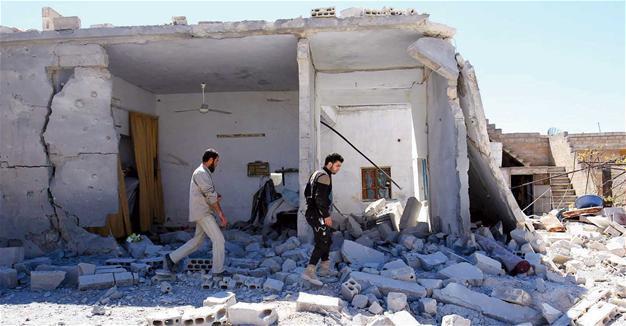No chemical weapon store in Syria-hit town: Turkey
Sevil Erkuş - ANKARA

A suspected gas attack in northwestern Syria that killed scores of civilians was carried out by regime forces, according to initial findings by Turkey, which said there were no chemical storage facilities in the area as claimed by Damascus.
Two Syrian SU-22 warplanes launched five sorties at around 6:30 a.m. on April 4 on the rebel-held town of Khan Sheikhoun in Idlib, a Turkish official told the Hürriyet Daily News, noting that the area hit was only residential.
The U.K.-based Syrian Observatory for Human Rights said at least five new air strikes were carried out on April 5.
Maj.-Gen. Igor Konashenkov of the Russian Defense Ministry said a warehouse that was destroyed in the strike was used to produce and store shells containing toxic gas that were to be shipped to Iraq.
Health Minister Recep Akdağ said that the number of wounded Syrians brought to Turkey for treatment following the attack was 30.
Turkish authorities and the World Health Organization (WHO) will conduct an examination on the chemical material that led to the killings of the civilians in order to determine what kind of chemical agent was used in the attack, said the Turkish official.
Three people who were transferred to Turkey after the attack subsequently died, Deputy Prime Minister Veysi Kaynak said, state-run Anadolu Agency reported.
“The wounded were brought to our hospital in Reyhanlı and they are being treated there. Of course, very technical conditions are required both to avoid [spreading the chemicals] to others and for their treatment. Three people died and I gave the instruction for an autopsy on one of them. I also want the World Health Organization or amnesty organizations to participate in the autopsy,” Kaynak said.
Turkey reminds Russia, Iran of truce responsibilitiesTurkey has reminded Russia and Iran of their responsibilities in preventing violations of a cease-fire in Syria after the attack, the Turkish Foreign Ministry’s spokesperson said in a written statement on April 5.
Following the chemical attack, the Russian and Iranian embassies in Ankara were immediately informed that “this nefarious attack constitutes a severe violation of the cease-fire deal,” said ministry spokesman Hüseyin Müftüoğlu.
The two countries “were reminded of their responsibilities to prevent such violations from occurring again and warn the party that carried out this attack, which constitutes a grave risk to the continuation of and soundness of the cease-fire deal,” Müftüoğlu said.
Turkey and Russia were especially critical in ensuring the signing of a cease-fire deal in Syria on Dec. 30, 2016.
 A suspected gas attack in northwestern Syria that killed scores of civilians was carried out by regime forces, according to initial findings by Turkey, which said there were no chemical storage facilities in the area as claimed by Damascus.
A suspected gas attack in northwestern Syria that killed scores of civilians was carried out by regime forces, according to initial findings by Turkey, which said there were no chemical storage facilities in the area as claimed by Damascus.